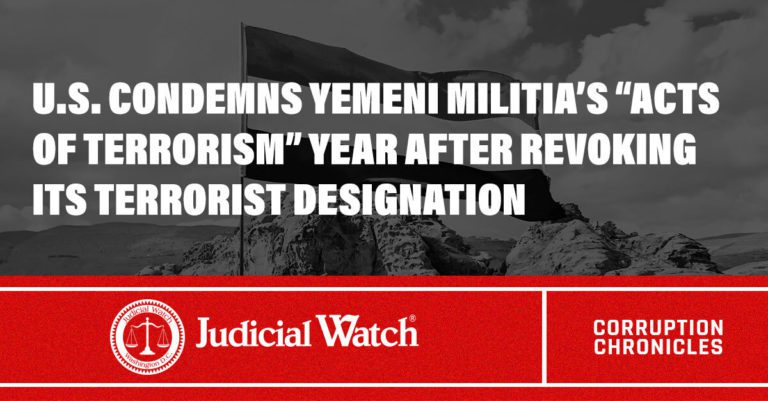
U.S. Condemns Yemeni Militia’s “Acts of Terrorism” Year after Revoking its Terrorist Designation

A year after the Biden administration bowed to international pressure by revoking the terrorist designation of a Yemen-based militant group, the U.S. is laughably denouncing the militia’s recent “acts of terrorism” against “civil infrastructure.” Known as Ansarallah (proponents of Allah) or Houthis, the Islamist organization recently launched drones and missiles at civilian targets in Saudi Arabia, including energy and water facilities. Following the strikes Secretary of State Antony J. Blinken, who announced the revocation of the government’s Houthis terrorist designation last year, issued a statement strongly condemning the multiple attacks on what is clearly civilian infrastructure. National Security Advisor Jake Sullivan confirmed that the unprovoked incidents were indeed “acts of terrorism,” though Uncle Sam no longer officially acknowledges the perpetrators as terrorists. Saudi Arabia and the Yemeni government have endorsed multiple United Nations calls for ceasefires, Sullivan added, but the Houthis continue to reject the calls and respond with terrorist acts.
Perhaps it is time to put the Houthis back where it belongs on the official U.S. terrorist list. After all, its home base of Yemen is a hotbed of terrorism that serves as the headquarters of Al Qaeda in the Arabian Peninsula (AQAP), which has appeared on the State Department’s list of Foreign Terrorist Organizations since 2010. However, the international community strongly opposed the Trump administration’s classification of another Yemeni radical faction, the Houthis, as a specially designated global terrorist entity asserting that it would come with repercussions for humanitarian operations. About a year ago, the Biden administration caved in, reversing the designation even as the U.S. Treasury’s Office of Foreign Assets Control (OFAC) sanctioned two key militants of the Iranian-backed Houthis. The agency identifies them as Mansur Al-Sa’adi and Ahmad ‘Ali Ahsan al-Hamzi and claims they are responsible for orchestrating attacks by Houthis forces impacting Yemeni civilians, bordering nations, and commercial vessels in international waters.
In properly classifying the Houthis/Ansarallah a Specially Designated Global Terrorist group the Trump administration wrote in a Federal Register bulletin that it has committed or has attempted to commit, or poses a significant risk of committing, or has participated in training to commit, acts of terrorism that threaten the security of U.S. nationals or the national security, foreign policy, or economy of the United States. Among those leading the effort to reverse the designation was the famously corrupt United Nations, which expressed “deep concern about the adverse humanitarian impact.” Blinken quickly obliged, explaining that the decision to revoke Ansarallah’s terrorist designation is a recognition of the dire humanitarian situation in Yemen. “We have listened to warnings from the United Nations, humanitarian groups, and bipartisan members of Congress, among others, that the designations could have a devastating impact on Yemenis’ access to basic commodities like food and fuel,” Blinken said. “The revocations are intended to ensure that relevant U.S. policies do not impede assistance to those already suffering what has been called the world’s worst humanitarian crisis.”
But reports indicate that Yemen’s humanitarian crisis is more dire than ever since the U.S. lifted the Houthis terrorist designation a little over a year ago. One Middle East expert who is a professor at a Virginia public university’s Terrorism, Transnational Crime and Corruption Center (TraCCC) writes this in a recent column: “As much of the United States’ attention is focused on Russia’s war on Ukraine, Yemen starves – and the humanitarian crisis has been worse, by many accounts, in the country since the Houthis’ terrorist designation was lifted on February 16, 2021.” A humanitarian group predicts that Yemenis face an uncertain 2022 as the conflict-driven economic collapse deepens. The U.S. apparently plans to deal with the situation by sending the Islamic nation money, lots of it. In the last few years Uncle Sam has spent north of $3.4 billion to “alleviate the suffering of the people of Yemen.” The most recent allocation of $191 million was announced days after the Biden administration revoked the Houthis terrorist designation.















